
SACCPS Conference 2020: South Africa and Africa – Prevaricating at the Precipice?
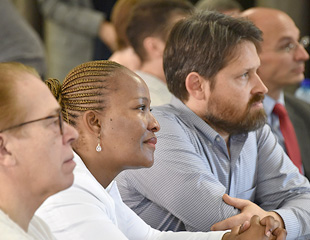
SACCPS held its annual conference on 10-11 February 2020 at the University of the Free State, South Africa. The conference was jointly hosted by the Department of Political Studies and Governance and the Centre for Africa Studies at the University of the Free State and the Osaka School of International Public Policy (OSIPP), Osaka University. In keeping with tradition, it focused on South Africa, southern Africa, and the African continent at large, as well as viewing connections between Africa and the outside world.
The range of topics explored was vast, ranging from governance issues at the level of municipalities, to a host of challenges at the national level, and a variety of security and governance issues at the continental and international level. The involvement of practitioners at the conference also continues to grow, with the perspectives of elected officials and bureaucrats, as well as corporate and media practitioners being expressed alongside those of the academics in attendance. While the title of the conference evokes a certain degree of gloom, signs of hope and progress were also brought to the fore by many of the participants.
See here for more
Participation at the ACUNS 2019 Workshop
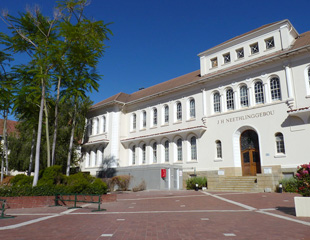
On 20 June 2019, SACCPS fielded a panel under the banner of “Building Stronger Institutions for Effective Governance” at the Academic Council on the United Nations System (ACUNS) annual workshop. The conference, held in conjunction with the Security Institute for Governance and Leadership in Africa (SIGLA) at Stellenbosch Univesity, focused on the issue of sustainable development and security.
The panel considered the scarring effects of poor governance on Africa, and was in agreement that without basic good governance to serve the interest of societies, democracy is not possible, and that conflict becomes inevitable as those marginalized confront uncaring incumbents. It saw this evidenced by the preponderance of African states occupying the lower echelons of the Global Peace Index as well as the Fragile State Index. Looking at the issue from a variety of angles, the panel explored the possibilities for building strong, effective and responsive state institutions for democratic governance and sustainable development.
Moderator: Hussein Solomon, University of the Free State
Democratic Security Sector Governance in Africa for the 21st century
George Abel Mhango, Mzuzu University
Building Strong Democratic Institutions in Africa: The Role of Civil Society
Gladys Mokhawa, University of Botswana
Democratic Governance and Conflict Sensitive Journalism
Virgil Hawkins Osaka University
Photo: Carton [CC BY 2.0]
SACCPS Conference 2019: South Africa and Africa: Between Promise and Peril
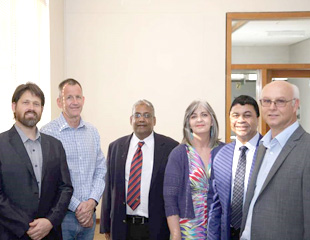
This year’s annual conference, held at the University of the Free State in Bloemfontein, South Africa on 11-12 February, again examined and discussed the situation in South Africa (day 1) and the African continent (day 2). It was jointly hosted by the Department of Political Studies and Governance and the Centre for Africa Studies at the University of the Free State and the Osaka School of International Public Policy (OSIPP), Osaka University.
As with previous years, discussion on South Africa focused on the political, security, economic and social issues facing the nation, and included sober reflection on the state of the nation as President Cyril Ramaphosa marked his first year in office. Regarding the Africa continent as a whole, speakers presented on a wide variety of issues, from the current state of affairs and long-term future prospects from strategic and military perspectives, to China-Africa relations, radicalization, and governments of national unity, among others. As usual, a considerable amount of variety could be seen in the background and position of the speakers, with both academics and practitioners offering their analysis on the issues at hand.
See here for more
Conference on identity and politics and site visits in Zambia
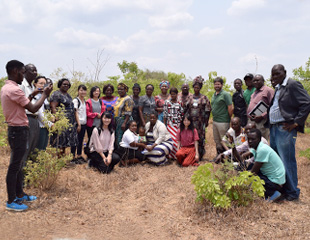
A conference dealing with the issue of identity and politics was held at Copperbelt University on 3 November 2018. As with previous years, the topic of the conference was particularly relevant for Zambia, where issues of ethnicity and identity have been becoming more visible and taking on a greater role in the political arena of the country. As such, the conference was focused primarily on Zambian issues, but also included perspectives from Asia, namely Japan, China and South Korea. The participation of students from Osaka University provided the opportunity for a workshop-style session with the students from Copperbelt University. The conference was followed up with meetings with parliamentarians and researchers at the National Assembly to discuss issues of peace and security in the country and the region, as well as site visits to a copper mine on the Copperbelt, and a school and clinic near Lusaka.
Conference on Security in Africa and the Outside World
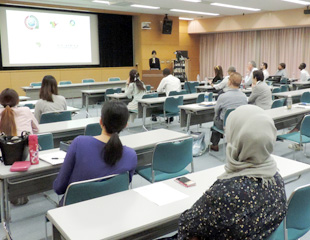
Together with Osaka University and the University of the Free State, the SACCPS held a conference on the subject of security in Africa and the outside world on 29 May 2018. The conference, held at Osaka University, brought together speakers from the aforementioned institutions, as well as from Stellenbosch University, and was comprised of three sessions. The first aimed to give those in attendance an overview of the security issues facing the continent, both from within, and in terms of its interaction with the outside world. The second session focused on outside interventions, with examples from the colonial era, more recent continental engagements, and the UN Security Council. The third session dealt with how the continent is viewed (or is not viewed) from the outside world, as seen through the lens of the news media. It goes without saying that the question of how the outside world engages with the security challenges facing the continent is an exceptionally complex and nuanced one, but one common thread seen in this conference was the questioning of both the intentions and effectiveness of such engagements. Many challenges clearly remain.
Conference SECURITY IN AFRICA AND THE OUTSIDE WORLD【PDF】
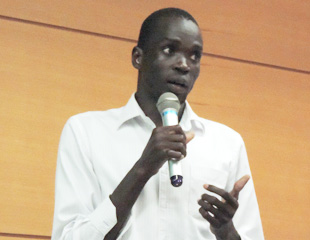
African security in the 21st Century: Challenges and opportunities
Hussein Solomon (University of the Free State, South Africa)
Somewhere between Africa and Europe: South African Security since 1994
Abel Esterhuyse (Stellenbosch University, South Africa)
Remittance Flows to Post-Conflict States in (Sub-Saharan) Africa: Perspectives on Human Security
Yani Karavasilev (Osaka University)
Session 2: Interventions
'The better Guiné': a case study of psychological strategies in counterinsurgency
César Rodrigues (Osaka University)
'Silencing the guns'? The African Union’s response to the conflict in South Sudan
David Gore (Osaka University)
Conflict in Africa and UN Security Council response
Elisabet Vergara Velasco (Osaka University)
Session 3: Media coverage
Poverty in the eye of the beholder: Personal and media perceptions of human security in Zambia
Azusa Iwane (Osaka University)
TICAD for who? Japanese media coverage of the TICAD conferences
Sooyeon Kim (Osaka University)
Off the radar: Coverage of conflict in Africa by the Japanese media
Virgil Hawkins (Osaka University)
SACCPS/CEAPS Conference 2018: Quo vadis South Africa and Africa?
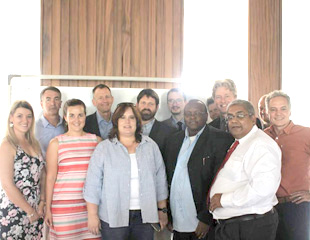
SACCPS/CEAPS held its annual conference on 12-13 February 2018 at the University of the Free State, South Africa. The conference was jointly hosted by the Department of Political Studies and Governance and the Centre for Africa Studies at the University of the Free State and the Osaka School of International Public Policy (OSIPP), Osaka University. As usual, it focused on South Africa, southern Africa, and the African continent at large. The past year has been particularly momentous for South Africa – the government of Jacob Zuma fell the day after the conference ended, and this future of South Africa dominated much of the discussion.

See here for more
Conference on historical heritage and security
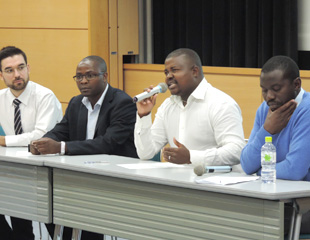
A conference discussing the issue of historical heritage and security was held on 15 November 2017 at Osaka University. The designation of historical heritage sites is typically seen as a positive method of preserving histories and cultures such that they may be appreciated and passed on to future generations. But the place in society of such historical heritage sites is not necessarily so straightforward or benign. Histories and cultures may be contested, and a site may serve to exacerbate tensions stemming from this contestation. In cases where there is armed conflict, the sites may even be targeted for destruction. The conference brought together speakers from Mzuzu University (Malawi), the University of the Free State (South Africa), and Osaka University (Japan). Covering issues in the region, the continent and beyond, speakers approached the topic from a wide range of perspectives. Their presentations are listed below.
Historical heritage in a domestic context: Africa
Community approaches to heritage preservation in the wake of resource exploitation for development
Aubrey Kabisala, Mzuzu University
The effect of cultural heritage on national cohesion in Malawi
Eugenio Njoloma, Mzuzu University
The impact of conflict on heritage preservation in the DR Congo
George Mhango, Mzuzu University
Continental context: Africa
Resettlement and the destruction of historical heritage: The construction of large dams in Lesotho
Mahlakeng Khosi Mahlakeng, University of the Free State
The role of traditional justice mechanisms in promoting peace in Africa
Theodora Thindwa, Mzuzu University
Blink and you'll miss it. Does the world miss the destruction of Africa's heritage sites?
Alta Grobbelaar, University of the Free State
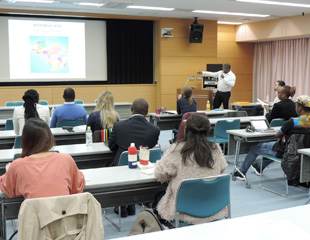
The work of memories in peacebuilding
Masataka Nakauchi, Osaka University
The determinants of the World Heritage status
Yani Karavasilev, Osaka University
Coverage of historical heritage sites in the New York Times: An overview
Virgil Hawkins, Osaka University
The UN Security Council and historical heritage: An upcoming issue
Elisabet Vergara Velasco, Osaka University
Conference on ethnicity and politics in Zambia
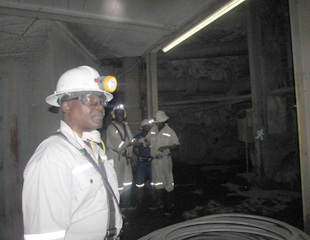
A conference on the relationship between ethnicity and politics was held on 3 November 2017 at the the Dag Hammarskjold Institute for Peace and Conflict Studies (DHIPS) at Copperbelt University, Zambia. Following on from a similarly themed conference held at the same venue in 2016, and forming a part of the research program being currently undertaken at DHIPS, this conference focused heavily on issues facing Zambia, and included such topics as ethnicity and electoral manipulation, guerrilla urbanization, and ethnic mobilization. As a point of reference, case studies from beyond the region, namely Asia, were also featured. Coinciding with a visit from Osaka University, participants visited a copper mine in the region, and held discussions with parliamentarians at the National Assembly of Zambia in Lusaka. The discussions focused on ethnicity and politics in Zambia, but also the broader issue of peace and security in Zambia and in the wider region.
Research meeting on the political and economic situation in Zambia
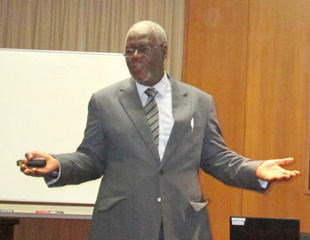
On 8 March 2017, a group of researchers presented findings on the state of democracy and economic growth in Zambia. The five speakers who presented were primarily from the Copperbelt University, Zambia, including Vice-Chancellor Naison Ngoma. The topics addressed a host of interlinked political and economic concerns in the country, including ethnolinguistic regionalism and politics in Zambia, economic integration, mining and the economy, and the use of social media in domestic politics. The discussion following the presentations focused on how these issues presented different facets of similar problems. The meeting was hosted by Osaka University.
SACCPS/CEAPS Conference 2017
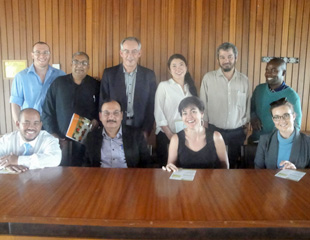
The future of South Africa is being viewed in increasingly bleak terms by many researchers and practitioners in the fields of economics and politics. Protests over service delivery, protests over university fees, and large-scale corruption are certainly not positive signs. The first day of this two-day conference, held 13-14 February 2017, focused on the current problems faced by South Africa – reflected in the title of the conference, a view from the precipice. The second day focused on a host of issues facing the continent beyond South Africa, including India-Africa relations, and the role of the ethnicity, non-state actors and the media in issues of peace and security in Africa. The conference was jointly held by the University of the Free State (South Africa), Jawaharlal Nehru University (India), and Osaka University (Japan).
See here for more
Discussions at Zambian National Assembly
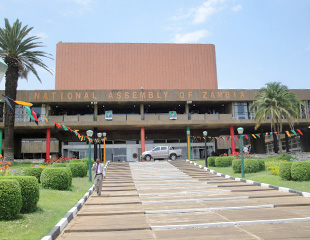
In November 2016, a group of scholars and practitioners (including Zambian members of parliament and visiting scholars) associated with the SACCPS held a series of discussions at the Zambian National Assembly on the subject of peace and security in the southern African region. The discussions focused on the many and varied challenges faced by the region, but also on the potential for the alleviation of those challenges. This included the possibilities for an expanded role for Zambia in this regard, given its peaceful history and its past contributions to the peace and stability of the region, including in terms of diplomatic initiatives, and the hosting of refugees from conflicts in the region.
Conference on ethnicity and politics in Zambia
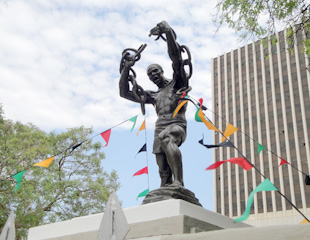
On 2 November 2016, a conference on the subject of ethnicity and politics was held at the the Dag Hammarskjold Institute for Peace and Conflict Studies (DHIPS) at Copperbelt University, Zambia. Copperbelt University is currently engaged in research for a project on ethnic power relations and conflict in fragile states, with ethnicity and politics becoming an issue of concern in Zambia. The conference provided an opportunity for some of the research to be presented. Research on the issue of ethnicity and politics was also presented by other participants (from Osaka University) using case studies from beyond Zambia, in Africa and in Asia, and some areas of parallel concern were identified by the participants.
Seminar on the Islamic State (IS)
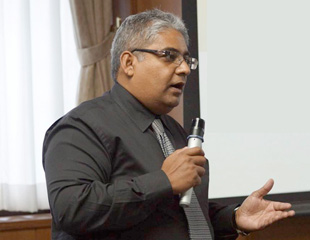
On 4 July 2016, Prof. Hussein Solomon (University of the Free State, South Africa) presented his research findings on the Islamic State (IS), during a visit at Osaka University. He spoke on its origins, its strategies and tactics, and the threat posed globally, including in South Africa and the southern African region. He also offered thoughts on what can and should be done to counter the IS threat. He also held further discussions regarding the importance of furthering research on the threats posed by such extremist organizations and ideologies on the African continent.
Research visit to Ethiopia
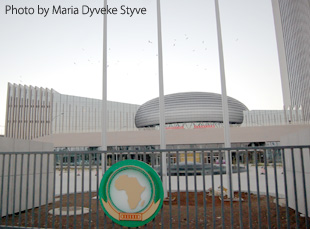
In September 2015, Marina Magalhães Barreto Leite da Silva, who is currently based at the University of the Free State in South Africa with the CEAPS program, visited Addis Ababa, Ethiopia as part of her research on the relations between the African Union (AU) and the United Nations (with a particular focus on the UN Security Council). She visited and interviewed researchers at the offices of the Institute for Security Studies (ISS), and the Institute for Peace and Security Studies (IPSS) at Addis Ababa University. She also conducted an interview with the chair of political affairs at the UN Office to the African Union (UNOAU) focusing on the interaction between the AU and the UN.
University of Burundi partnering with CEAPS
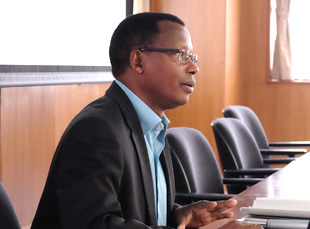
The University of Burundi (specifically the Research and Training for Peace Centre, CERFOPAX, UNESCO Chair) is partnering with the University of the Free State and Osaka University (along with other universities and research institutes in Africa) for the CEAPS program. This partnership will involve joint involvement in CEAPS and other research programs. The University of Burundi's participation is led by Professor Leonidas Ndayisaba, the Director of CERFOPAX. This partnership follows a CEAPS visit to Burundi University in February 2015, and a visit by Professor Ndayisaba to Osaka University in July 2015.
Visit to Lesotho

In June 2015, M. K. Mahlakeng (University of the Free State) and Virgil Hawkins (Osaka University) participated in a CEAPS visit to Lesotho. They held discussions with Lesotho's Minister of Communications, Science and Technology and Minister of Home Affairs on various subjects pertaining to peace and security in the southern African region. The visitors also participated in the Social Accountability Learning Lab, held by World Vision in Berea District, which brought together representatives from the government, the media and civil society, including representative from World Vision throughout the region. The visitors particularly played an active part in the panel focusing on the role of the media in brokering state-citizen accountability relationships.
Researcher takes up position at University of the Free State
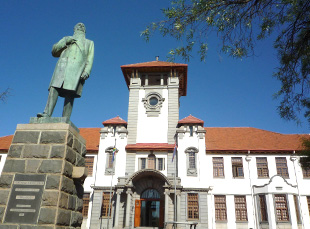
In May 2015, Marina Magalhães Barreto Leite da Silva took up a ten-month research position with the CEAPS program at the University of the Free State, South Africa. Based at the Faculty of the Humanities with Professor Hussein Solomon, she will focus her research efforts on the relationship between the African Union (AU) and the United Nations, with a particular emphasis on the UN Security Council, and the ongoing discussions surrounding the possibility of its reform.
Researchers take up positions at Eduardo Mondlane University
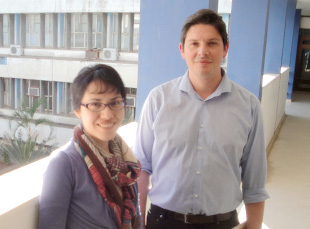
In April 2015, Rui Faro Saraiva and Carla Bringas took up ten-month research positions with the CEAPS program at Eduardo Mondlane University in Maputo, Mozambique. Both are based at the Centre for African Studies at the university. Rui Faro Saraiva's research will be focused on the security issues surrounding the Community of Portuguese Language Countries (CPLP), as well as Japanese involvement in security issues in Africa. The topic of Carlas Bringas' research is the role of development aid in peacebuilding, particularly in Mozambique.
Dr. Mokhawa visited Osaka University
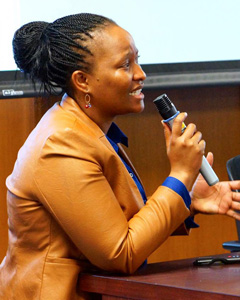
From 30 June to 7 July 2013, Dr. Gladys Mokhawa, a lecturer in the Department of Political and Administrative Studies, University of Botswana, visited the Osaka School of International Public Policy (OSIPP) at Osaka University, Japan. In addition to furthering collaborative work on projects for the SACCPS (including a book project), she presented a lecture to faculty and students entitled 'Peacebuilding in Southern Africa'. This focus on the subject of peacebuilding reflects the collective research topic for SACCPS for 2013 – peacebuilding will be the main theme for the 2013 conference to be held in Lusaka, Zambia in September. Dr. Mokhawa also set aside a considerable amount of time to discuss research on issues of peace and security with students at OSIPP.
Mr. Tunamsifu at the University of South Africa
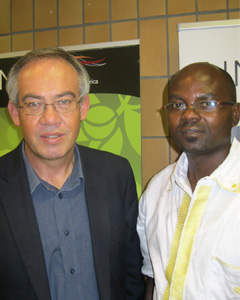
As of February 2013, Philippe Tunamsifu, a lecturer at the Free University of the Great Lakes (ULPGL) in Goma, DR Congo, has temporarily relocated to Pretoria. Based at the University of South Africa (UNISA), he is conducting a comparative study of transitional justice in the Republic of South Africa and the Democratic Republic of Congo. He is expected to be at UNISA for the remainder of the year. Apart from his research agenda, he is also taking the opportunity to interact and exchange ideas for collaboration with other SACCPS members. Here he is seen with Professor Dirk Kotze, who is also based at UNISA.
SACCPS group visited ACCORD (South Africa)
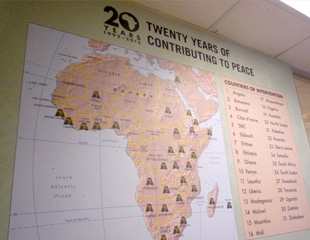
On 12 February 2013, a group of SACCPS researchers led by Professor Hussein Solomon (University of the Free State, South Africa) visited the African Centre for the Constructive Resolution of Disputes (ACCORD) in Durban, South Africa. After a tour of ACCORD's impressive facilities, discussions were held on possibilities for collaboration between ACCORD and SACCPS. In mid-March, Professor Solomon was invited for a follow-up visit to further discussions on these issues directly with the Founder/Executive Director of ACCORD, who at the time of the initial visit had been on mission in Kenya which was preparing for elections.
SACCPS workshop held at the University of the Free State (South Africa)
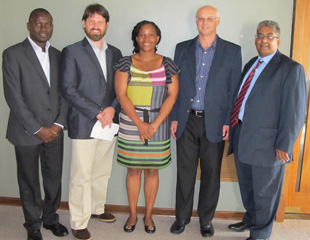
On 11 February 2013, the SACCPS and the Department of Political Studies and Governance, University of the Free State (UFS, South Africa) hosted a workshop entitled 'Reflections on Southern African Peace and Security'. After a welcoming address by Prof. Lucius Botes, Dean of the Faculty of the Humanities at UFS, the participants, in two sessions, proceeded to explore issues critical to the security of the region. These include broad thematic issues, such as SADC and people-centred security and media coverage, and specific case studies, namely the DRC, Zimbabwe and South Africa. The discussions that followed the presentations drew thought-provoking contributions from both the participants and the floor.
The presentations:
A community of isolated states? The news media in southern Africa【PDF】
Virgil Hawkins, Osaka University
Is SADC an agent of diffusion to the Democratic Republic of the Congo's security concerns?
Gladys Mokhawa, University of Botswana
SADC and human security: Between rhetoric and reality【PDF】
George Mhango, Mzuzu University
From state-centric to people-centred conflict resolution initiatives in SADC: The case of Zimbabwe【PDF】
Hussein Solomon, University of the Free State
Reflections on the 2013 Zimbabwean elections
Martha Mutisi, ACCORD
Revisiting South Africa's political risk profile
Theo Neethling, University of the Free State
Mr. Mhango visited the University of Botswana
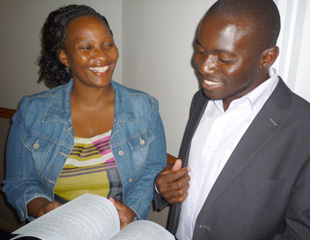
From 5 to 9 February 2013, George Mhango, a lecturer and researcher at the Centre for Security Studies at Mzuzu University, Malawi, visited the University of Botswana in Gaborone, Botswana. Hosted by Gladys Mokhawa, an active member of the SACCPS network, who lectures there in political science, Mr. Mhango interacted with faculty and students at the University of Botswana, with discussions focusing on issues associated with the Southern African Development Community (SADC). Mr Mhango and Dr. Mokhawa also spent a considerable amount of time working on plans for an edited book that will be produced through the SACCPS network.
Osaka University group visited southern Africa
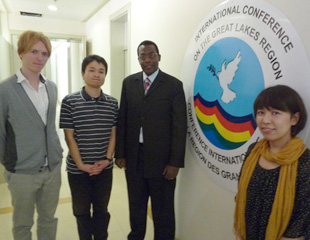
From 5 to 16 February 2013, a group from the Osaka School of International Public Policy (OSIPP) at Osaka University visited Zambia, South Africa and Tanzania, with a view to holding discussions on the network with SACCPS members throughout the region. In Zambia, the group visited the University of Zambia and the Copperbelt University, as well as the Ministry of Foreign Affairs, including its national office for the International Conference on the Great Lakes Region (ICGLR). In South Africa, the group took part in an SACCPS workshop at the University of the Free State, and visited the African Centre for the Constructive Resolution of Disputes (ACCORD). In Tanzania, the visits were to the Mozambique-Tanzania Centre for Foreign Relations, and the University of Dar es Salaam. The group included Professor Virgil Hawkins and masters students Naho Hashimoto, Kazuma Sakano, Justin Wolfe, and Chenming Zhang, who joined the group in Tanzania.
Mr. Mhango visited Osaka University
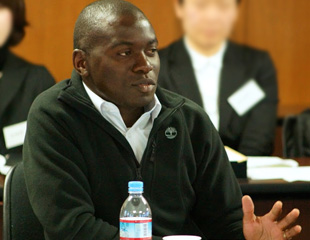
From 13 to 19 January 2013, George Mhango, who is a lecturer and researcher at the Centre for Security Studies at Mzuzu University, Malawi, visited the Osaka School of International Public Policy (OSIPP) at Osaka University, Japan. He presented a lecture for a joint project between OSIPP and the Global Collaboration Center (also at Osaka University), entitled 'Governing the public sector in Southern Africa: Past, present and future', looking at reforms in the public service. He delivered another lecture for OSIPP students, entitled 'The Southern African Development Community and human security'. He also participated in a workshop arranged at OSIPP on the topic of human security in Asia, providing a further opportunity for academic interaction and exchange of ideas.
Prof. Neethling visited Osaka University (Japan)
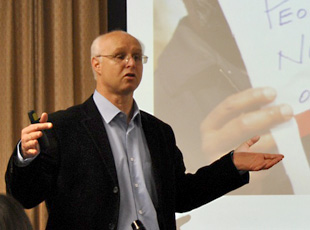
From 28 November to 5 December 2012, Professor Theo Neethling, who heads the Department of Political Studies and Governance at the University of the Free State, South Africa, visited the Osaka School of International Public Policy (OSIPP) at Osaka University, Japan, to further develop relations between the two institutions. Professor Neethling handed to the Dean of OSIPP a signed agreement on academic exchange, formally linking the Faculty of the Humanities at the University of the Free State with OSIPP. In between interactions with students and faculty, he found the time to deliver two in-depth and thought-provoking lectures: 'Norm dynamics and ambiguity in South African foreign policy; The case of the no-fly zone over Libya【PDF】', and 'Post-conflict reconstruction and development in the DRC: Revisiting the main challenges and the role of the UN【PDF】'.
SACCPS group visited Zimbabwe


From 25 to 27 September 2012, a group of SACCPS members travelled to Zimbabwe to further build on the network, and to raise awareness about the SACCPS and its activities. The group, consisting of Anthony Kasandwe (SACCPS coordinator, Zambia), Godfrey Marera (St. Bonaventure College, Zambia) and Virgil Hawkins (Osaka University, Japan), visited the Faculty of Social Studies and the Centre for Defence Studies at the University of Zimbabwe, the Institute of Peace, Leadership and Governance at Africa University in Mutare, and met with researchers at the Great Zimbabwe University. The group held talks with faculty members at each of the universities, and found a strong interest in contributing to the SACCPS-run journal (Southern African Peace and Security Studies) as well as in future collaboration at an institutional level with the network.
Prof. Ndayisaba visited Copperbelt University (Zambia)

From 24 to 26 September 2012, Professor Leonidas Ndayisaba (University of Burundi) visited Copperbelt University (Zambia) to further develop relations between the two institutions, with a particular focus on the Dag Hammarskjold Institute for Peace and Conflict Studies (DHIPS). The visit followed his participation in the SACCPS conference on peacekeeping and peace enforcement in Lusaka, where Professor Ndayisaba presented his research on UN peacekeeping operations in Burundi. At Copperbelt University, he held meetings with the faculty, interacted with students, and had the opportunity to offer a public lecture under the title of Experiences of Ordinary People during the Conflict in the Great Lakes Region.
2012 Conference: Peacekeeping and Peace Enforcement

From 21 to 23 September 2012, the SACCPS held its second major conference in Lusaka, Zambia. This time the focus was on peacekeeping and peace enforcement (the topic for 2011 was mediation and peacemaking). Speakers from eleven universities throughout (and beyond) the southern African region presented the results of their research, in sessions covering the broad underlying issues, the involvement of the Southern African Development Community (SADC), the sole current peacekeeping operation in the region - that in the Democratic Republic of Congo (DRC), and issues beyond the region.
Read more
Ms. Chibesakunda visited Osaka University (Japan)

Ms. Winnie Natala Chibesakunda, Assistant Director for Asia and Pacific, Zambian Ministry of Foreign Affairs, visited Osaka University, meeting with Professor Toshiya Hoshino, Dean of the Osaka School of International Public Policy (OSIPP), and Virgil Hawkins, an associate professor also at OSIPP. They discussed Zambia politics, the current state of academic collaboration between OSIPP and various academic institutions in Zambia, including joint research and student exchange, and plans for the realization of a physical centre for the SACCPS in Zambia. Ms. Chibesakunda expressed an interest in participating in the forthcoming SACCPS conference in Zambia, and encouraged further linkages between the network and the Zambian Ministry of Foreign Affairs.
Prof. Hoshino visited Copperbelt University (Zambia)

Professor Toshiya Hoshino, Dean of the Osaka School of International Public Policy (OSIPP) at Osaka University (Japan), visited Copperbelt University from 18 to 20 March 2012. Here, Professor Hoshino signed a Memorandum of Understanding on Academic Exchange with the acting Vice Chancellor of Copperbelt University. The signing was also attended by the Ambassador of Japan to Zambia. Collaboration will be centred around the activities of the Dag Hammarskjold Institute for Peace and Conflict Studies (DHIPS), led by Professor Naison Ngoma, which is scheduled to be relocated from within the university to the vicinity of the crash site of the second UN Secretary-General, near Ndola (Zambia). Professor Hoshino also presented a lecture at Copperbelt University on the topic of peacebuilding.
Prof. Hawkins and Mr.Saraiva visited southern Africa

Virgil Hawkins and Rui Faro Saraiva from Osaka University (Japan) visited Zambia, South Africa and Mozambique from 20 February to 5 March 2012 to hold consultations on the future of the project and the growing network.
In Zambia, they held a series of consultations with the project coordinators at the core institutions in Zambia (University of Zambia and Zambian Open University) to plan for the 2012 conference and for the realization of the proposed Centre for Collaboration on Peace and Security. They also visited the Dag Hammarskjold Institute for Peace and Conflict Studies (DHIPS) at the Copperbelt University to discuss possible future collaboration.

In South Africa, Hawkins and Saraiva visited the University of the Free State in Bloemfontein, where they were hosted by the project coordinator for South Africa, Professor Hussein Solomon. They held consultations with the Head of Department of the Department of Political Studies and Governance and with the Dean of the Faculty of the Humanities. Hawkins also made a presentation entitled 'Western media coverage of the Inter-Congolese Dialogue'【PDF】, focusing primarily on the lack of coverage that the peace process in the Democratic Republic of Congo was able to attract.

In Mozambique, Hawkins and Saraiva were joined by Anthony Kasandwe, one of the Zambian coordinators, where they held consultations aimed at strengthening the network: at the Polytechnic University, Higher Institute for International Relations and Eduardo Mondlane University. At Eduardo Mondlane University, Hawkins also made a presentation for faculty and students entitled 'Western media coverage of Africa'【PDF】.
Mr. Mhango visited Stellenbosch University (South Africa)

George Abel Mhango, a lecturer at Mzuzu University (Malawi), visited Stellenbosch University (South Africa) from 13 to 19 February 2012, where he was hosted by Gerrie Swart at the Department of Political Science. Mhango interacted with faculty and students at Stellenbosch, and conducted research on peacemaking in the southern African region. He also had the opportunity to present a lecture entitled 'Contesting state fragility in hybrid regimes'【PDF】, which, drawing on recent political, economic and security challenges facing Malawi, aimed at problematizing peace under the backdrop of southern Africa's 'hybrid' regimes.
Mr. Walwa visited the University of the Free State (South Africa)

Mr. William John Walwa, of the University of Dar es Salaam (Tanzania), visited the University of the Free State (South Africa) from 6 to 26 February 2012, to further build ties between the two universities, conduct research, work on his Ph.D. proposal and take the examination for the Ph.D. course. Hosted by Prof. Hussein Solomon, Mr. Walwa interacted with faculty and students, including the Dean of the Faculty of Humanities, and the Head of Department of Political Studies and Governance.
Over the course of his three weeks at the University of the Free State, Mr. Walwa completed and successfully defended his Ph.D. proposal, entitled 'Relative importance of the causes and conflict resolution approaches to transform environmental conflicts in Africa: The case of North Mara and Niger Delta'【PDF】. The thesis aims to examine the links between the exploitation of natural resources and conflict, looking at the deaths caused by state and security personnel at gold mining sites in North Mara, Tanzania, and the armed conflict linked to oil in the Niger Delta of Nigeria.
Prof. Solomon visited Osaka University(Japan)

Professor Hussein Solomon from the University of the Free State (South Africa) visited Osaka University (Japan) from 23 November to 14 December 2011. Based at the Osaka School of International Public Policy (OSIPP), he made a presentation, participated in classes and seminars, interacted with faculty, researchers and students (both from and beyond the university), and got some writing done - polishing off two papers and several blog entries during his stay. His presentation was entitled 'Southern Africa's democratic deficit: the nexus between economics and politics'【PDF】, and officially kicked off OSIPP's Africa Seminar Series. His visit also saw some brainstorming about the future of the nascent Oasis of Peace Project.
【Blog】"South Africa: The Next Tunisia" By Hussein Solomon
2011 Conference: Mediation and Peacemaking in Southern Africa

The project held its first annual conference, on the subject of mediation and peacemaking, in Lusaka Zambia from 23 to 25 September 2011. The conference brought together participants from the region (as well as from Japan) and was broken down into three main sessions: regional perspectives, Zambian perspectives, and perspectives beyond Southern Africa, with a fourth session set aside for roundtable discussions on the broad challenges for mediation and peacemaking in the region, and avenues for future collaboration within and beyond the current project.

While the conference was centred around a series of presentations by members of the academia, it also attracted participants from governments (most notably representatives of the International Conference on the Great Lakes Region), as well as from local/international NGOs and the local media. The discussion covered both the academic and practical angles of the issues at hand and it is hoped that the results will prove beneficial for the future efforts of those on both sides.
Interestingly, the conference coincided with historic elections in Zambia that saw the peaceful transfer of power from one administration to another the day before the conference began. Needless to say, this gave the conference participants plenty to discuss, and perhaps added a touch of optimism regarding the future of peace and security of the region.

Participants discussed the details of the to-be-established online journal (Southern African Peace and Security Studies), setting up a journal structure and deciding upon the roles and responsibilities with a view to its publication.
The networking function of the conference has already begun to bear fruit. A connection made at the conference has led to one participant from the University of Dar es Salaam being accepted as a Ph.D. student at the University of the Free State.
The movement of scholars throughout the region is scheduled to continue, and the next conference is tentatively scheduled for September 2012.






